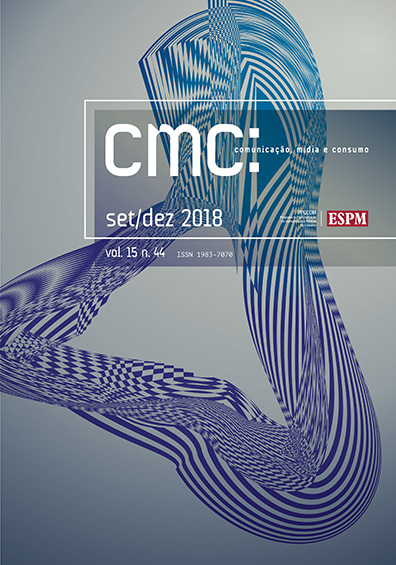Vingar e Punir: Motivações para a prática do Spoiling
DOI:
https://doi.org/10.18568/cmc.v15i44.1632Palavras-chave:
Spoiling, Séries, Fãs, Práticas tóxicas.Resumo
Através de um survey com fãs brasileiros de séries televisivas americanas (n=1805), buscamos lançar luz sobre a prática do spoiling. Sabendo que a prática realizada pelos fãs é constituída por discursos enraizados no capital cultural e subcultural e, em negociações de poder dentro de cada comunidade, procuramos entender o espectro de toxicidade por trás do spoiling. Os resultados indicam que o spoiling tornou-se uma fonte de sociabilidade, troca de conhecimento, bem como prazer para o fã brasileiro. Porém, a prática também é utilizada por vingança ou até mesmo para "punir" espectadores atrasados. Observou-se que os fãs se aproveitam da possibilidade de mostrar mais conhecimento entre si, levando a conflitos nos fandoms e revelando o potencial tóxico por trás da difusão de spoilers.
Downloads
Referências
BAYM, N. Tune in, log on: soaps, fandom, and online community. London: Sage, 2000.
BAKHTIN, M. M. Rabelais and his world. Indiana University Press, 1984.
BARDIN, L. Análise de Conteúdo, São Paulo, Edições 70, 2011.
BOURDIEU, P. La distinction: critique sociale dujugement. Paris: Minuit, 1979 __________, P. What makes a social class? On the theoretical and practical existence of groups. Berkeley Journal of Sociology, n. 32, p. 1-49, 1987.
__________, P. Social space and symbolic power. Sociological theory, 7(1), 14-25, 1989.
BROWN, M. E. Soap opera and women's talk: The pleasure of resistance. London: Sage Publications, 1994.
CASTELLANO, M; MEIMARIDIS, M; DOS SANTOS, M. A. Game of Spoilers: Disputas no consumo da ficção seriada televisiva. Comunicação Midiática, v.12 n.3, p.113-128, 2017.
Chau, P. Y., et al. (2002). Cultural differences in the online behavior of consumers. Communications of the ACM, 45(10), 138-143.
FRAGOSO, S. “HUEHUEHUE eu sou BR”: spam, trollagem e griefing nos jogos on-line. Revista FAMECOS: mídia, cultura e tecnologia, v. 22, n. 3, 2015.
GRAY, J. Show sold separately: Promos, spoilers, and other media paratexts. NYU Press, 2010.
GRAY, J; MITTELL, J. ‘Speculation on Spoilers: Lost Fandom, Narrative Consumption and Rethinking Textuality’. Participations Journal of audience and reception studies, vol 4, no 1, 1-35, 2007.
HASSOUN, D. Sequential outliers: The role of spoilers in comic book reading. In: Journal of Graphic Novels and Comics, 4(2), 346-358, 2013.
HILLS, M. ‘Psychoanalysis and digital fandom: Theorizing spoilers and fans’
self-narratives’ in Produsing theory in a digital world: The intersection of
audiences and production in contemporary theory edited by Rebecca A. Lind,
-122, New York: Peter Lang Inc, 2012.
JENKINS, H. ’Do You Enjoy Making the Rest of Us Feel Stupid?’: alt. tv. twinpeaks, the Trickster Author, and Viewer Mastery. Full of secrets: Critical approaches to Twin Peaks, p. 51-69, 1995. NYU Press, 2006.
________, H. Cultura da convergência: a colisão entre os velhos e novos meios de comunicação. São Paulo: Aleph, 2009.
JOHNSON, B. K; ROSENBAUM, J. E. Spoiler alert: Consequences of narrative spoilers for dimensions of enjoyment, appreciation, and transportation. Communication Research, v. 42, n. 8, p. 1068-1088, 2014.
LOPES, MIV; GÓMEZ, G. O. (Re)Invenção de gêneros e formatos da ficção televisiva: anuário Obitel 2016. Porto Alegre: Sulina, 2016.
NEWMAN, M. Z. Free TV: file-sharing and the value of television. Television & New Media, v. 13, n. 6, p. 463-479, 2012.
PASE, A. F; SACCOMORI, C. Significações da prática e do consumo de spoilers de seriados americanos: estragando (ou não) a surpresa da narrativa. In: Simone Pereira de Sá, Rodrigo Carreiro, Rogério Ferraraz. (Org.). Cultura Pop. 1ed.Salvador: Edufba, 2015, v. 1, p. 187-209.
PERKS, L. G; MCELRATH-HART, N. Spoiler definitions and behaviors in the post-network era. Convergence: The International Journal of Research into New Media Technologies, p. 1-15, 2016a.
SULER, J. The online disinhibition effect. Cyberpsychology & behavior, 7(3), 321-326, 2004.
THORNTON, S. Club Cultures: Music, Media and Subcultural Capital. Oxford: Polity, 1995.
WILLIAMS, R. " It’s About Power": Spoilers and Fan Hierarchy in On-Line Buffy Fandom. Slayage: The Online International Journal of Buffy Studies, v. 11, p. 1-15, 2004.







